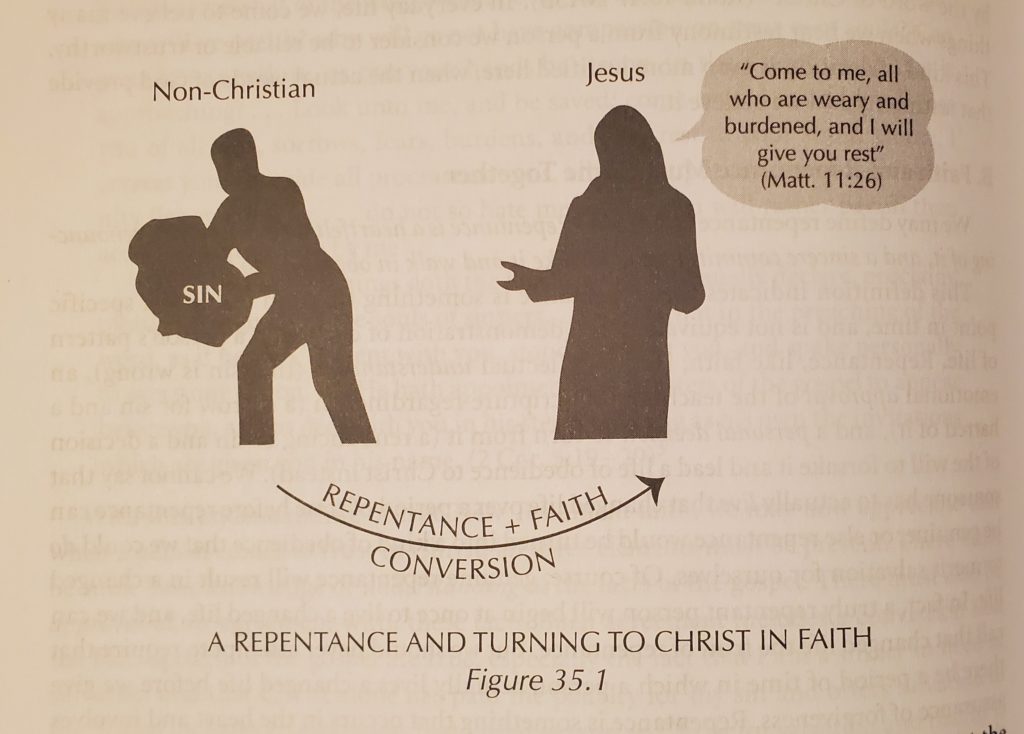Reading Systematic Theology with Wayne Grudem – What is true repentance? What is saving faith? Can people accept Jesus as Savior and not as Lord?
This post is part of a 50+ post series from the classic work by Wayne Grudem (PhD, Cambridge), Systematic Theology: An Introduction to Biblical Doctrine. The aim of each post is to provide an overview of each chapter in the book and related resources for each topic.
Synopsis of Chapter
In his chapter on conversion, Wayne Grudem reviews what the nature of conversion is. Grudem defines conversion as “our willing response to the gospel call, in which we sincerely repent of sins and place our trust in Christ for salvation.”
Grudem describes how genuine faith includes aspects of certain knowledge, approval of those facts, and personal trust in Christ. In addition, conversion includes elements of faith and repentance. True faith must also include both faith and repentance from sin. Finally, the fruit of conversion is that faith and repentance will continue throughout life.
True Faith Includes, Knowledge, Approval & Personal Trust
Genuine faith in conversion includes several components. For one, it includes knowledge and approval. Paul rhetorically asks, “And how are they to believe in him of whom they have never heard” (Romans 10:14)? In other words, in order to be saved a person must know certain facts about Jesus and their condition. In addition, it includes approval of those facts. James tells his readers “You believe that God is one; you do well. Even the demons believe—and shudder!” (James 2:19). So knowledge was not enough for salvation. They must also approve of certain teachings.
But more than knowledge and approval, genuine faith requires personal trust. The Greek word for faith is pistis (πίστις) defined as “proper persuasion” by Strongs. Faith or belief is how we trust God to be saved. There are several verses that illustrate salvation by faith or belief:
- “But to all who did receive him, who believed in his name, he gave the right to become children of God” (John 1:12).
- “For God so loved the world, that he gave his only Son, that whoever believes in him should not perish but have eternal life.” (John 3:16)
- “Consequently, he is able to save to the uttermost those who draw near to God through him, since he always lives to make intercession for them” (Hebrews 7:25).
So salvation happens when someone believes certain things, approves of those things, and ultimately puts personal trust in Christ for salvation. This is what happens when a person is saved, though repentance plays a role in salvation as well.
Faith & Repentance Must Come Together
Genuine faith also includes repentance from sins. Repentance can be defined as “a heartfelt sorrow for sin, a renouncing of it, and a sincere commitment to forsake it and walk in obedience to Christ.” Repentance is more than grief for sins. Paul distinguished between genuine repentance and worldly repentance when he said, “For godly grief produces a repentance that leads to salvation without regret, whereas worldly grief produces death” (2 Corinthians 7:10).
Several verses tie faith and repentance together (emphasis mine):
- Jesus speaking: “and said to them, “Thus it is written, that the Christ should suffer and on the third day rise from the dead, and that repentance for the forgiveness of sins should be proclaimed in his name to all nations, beginning from Jerusalem.” (Luke 24:46-47)
- “Repent therefore, and turn back, that your sins may be blotted out” (Acts 3:19).
- “Therefore let us leave the elementary doctrine of Christ and go on to maturity, not laying again a foundation of repentance from dead works and of faith toward God” (Hebrews 6:1).
True repentance includes a turning away from sin and a turning toward Jesus. John Murray spoke of it as a “penitent faith” or a “believing repentance.” If a person does not turn away from their sins, then their faith is not real. Grudem illustrates repentance and faith in the act of conversion on page 714 in Figure 35.1.

Application: Faith & Repentance Continue Throughout Life
By way of application, faith and repentance are not one-time events in conversion. The reason is God does not save people and immediately make them sinless. Instead, followers of Christ make a habit of believing God and turning from their sin.
In Revelation, Jesus called his church to “be zealous and repent” (Revelation 3:19). The readers were already his church, but they were still called to turn away from sin. Not only that, Christians are to continue to live lives in faith. As Paul said, “And the life I now live in the flesh I live by faith in the Son of God, who loved me and gave himself for me” (Galatians 2:20). In the same way, our lives as Christians should be marked by our turning away from sin and turning toward Jesus in faith.
“For God so loved the world, that he gave his only Son, that whoever believes in him should not perish but have eternal life.” (John 3:16)
Special Terms
- faith
- repentance
- trust
Resources: Wayne Grudem
- Wayne Grudem: Book: Systematic Theology: An Introduction to Biblical Doctrine
- Wayne Grudem: 148 Lectures on Systematic Theology
Related Resources
- OpenBible.info: Verses on Conversion
- Steven Lawson: What is True Conversion?
- J.I. Packer: On Conversion
- Monergism.com: Articles on Conversion








